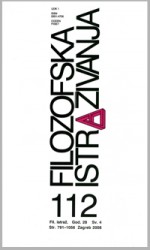Spoznaja između vjere i sumnje
Cognition between Faith and Doubt
Author(s): Milan PolićSubject(s): Philosophy
Published by: Hrvatsko Filozofsko Društvo
Keywords: truth; cognition; suspicion; belief; creed; knowledge
Summary/Abstract: Except for intuitive cognitions by which (self)consciousness is immediately aware of itself as existing, all other cognitions are mediated in multiple ways. To make this possible in the first place they need to be based on the belief from which even the most modest hypotheses can stem. Although firm faith or at least some kind of similar belief in the validity of the hypotheses is the necessary origin of every mental-rational cognition, doubt is the only thing that can lead to knowledge from those hypotheses. Faith which is not open to doubt and verification is cognitively futile. Furthermore, it is truth-evasive. Bearing that in mind doubt is that what makes thinking critical and draws the boundary between philosophy as philo-sophia and arrogant dogmatism, pure-sense limitation and ideological falseness. So if mental-rational cognition without faith or at least belief is not possible, the faith which does not respect or which even negates mental-rational cognition is unworthy of living.
Journal: Filozofska istraživanja
- Issue Year: 28/2008
- Issue No: 04/112
- Page Range: 823-833
- Page Count: 11
- Language: Croatian

